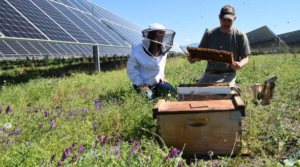The National news picked up the potential conflict in Oregon between solar energy use of Agriculturally-zoned lands and beekeeping. A 73-acre solar project near Estacada in Clackamas County requested an exemption to build on agricultural land. To qualify, the solar project developer included establishing 100 beehives on the property and planting “bee-friendly forage” around the panels and “shade resistant native plants” beneath the solar panels. http://www.capitalpress.com/Oregon/20180608/beehive-solar-project-draws-opposition
Under Oregon’s current land use goal of preserving farmland, solar power facilities can be no larger than 12 acres without an exception. Clackamas hearings officer Fred Wilson granted the exemption citing beehives and use of the area under the panels for forage.
A non-profit farmland conservation group, 1,000 Friends of Oregon, challenged the Clackamas County conditional use permit. The Oregon Farm Bureau too apparently had an issue with the proposal, although it is not clear if they have contacted the Oregon State Beekeepers, a long-time Farm Bureau member. Mary Anne Cooper, public policy counsel for the Farm Bureau contested the project before the Oregon Board of Agriculture during a June 7 meeting in Hood River.
The project developer, Steve Schmitt of Pacific Northwest Solar LLC, estimated the apiary will generate $75,000 per year. Opponents claimed the actual revenue would be about 80 percent lower. Fred Wilson, the hearing officer said “Even if income is less than the projected amount, the proposed apiary seems more likely than not to produce significant amounts of income that would still constitute contributing in a substantial way to the area’s existing agricultural economy,” He called the project “a win-win scenario.”
A broad resolution that “supports a better definition of highly productive farmland” calling for stronger land use protections for farmland when siting solar projects and other energy facilities was unanimously approved by the Board of Agriculture. Yamhill County prohibits such facilities on top soil classes while Marion County has excluded them from “exclusive farm use” zones. Recently a Yamhill 12 acre array proposal was denied based on neighboring vineyard opposition.
In contrast there is a 40-acre “clean-energy farm” in Eagle Point (outside Medford), the largest “solar apiary” in Jackson County that includes Honey bees. John Jacob, Old Sol apiaries and newly elected OSBA President, maintains 48 colonies interspersed among the solar panels. The colonies average100-200 pounds of honey/colony, compared to county average of 30-40 pounds/colony. https://www.solarpowerworldonline.com/2018/08/case-study-eagle-point-solar-farm-apiary/
Photo attached shows John inspecting one of his colonies in the Medford solar array
John sees many benefits from his perspective as a beekeeper. Eagle Point “offers his bees the opportunity for a diverse diet” and additionally to avoid pesticides “ …… these are places where we can take our bees to help their overall health and to recover from their pollination duties.”
A different proposal (not including bees or pollinators) for an 80 acre solar project near Medford, approved by Jackson County as an exemption to the 12 acre limitation, was struck down by the Oregon Court of Appeals (on some technicalities). The issue will go to the Oregon Supreme Court this next May. John says there are other projects of solar and bees in Southern Oregon being developed.
A project in Vermont has called their combining solar array panels and planting for pollinators a success. https://www.rutlandherald.com/opinion/perspective/planting-for-pollinators-at-solar-arrays-a-success-story/article_95dbb728-d38e-58cd-9b87-6aa10add1bf7.html A survey of pollinator population at an early demonstration project in Middlebury resulted in an increase of greater than five-fold in unique pollinator populations in just one year.
The Clackamas project will go ahead. 1,000 Friends of Oregon agreed to withdraw their opposition per agreement by the developer Pacific Northwest Solar, LLC to study how dual use of beekeeping and planting for pollinators works. Their attorney Meriel Darzen called the “pilot project…an interesting concept”. Pacific Northwest Solar agreed to drop their challenge of the current ruling of a 12 acre size limitation. The ODA, after an October 6 meeting, is continuing to look at regulations established in 2010 on solar and land use. http://www.capitalpress.com/Energy/20181005/settlement-allows-beehive-solar-project-to-go-forward
